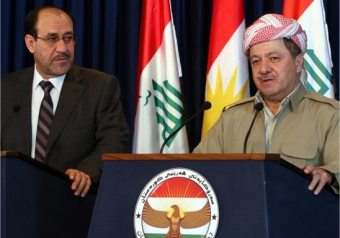Iraq Analysis: Kurdistan's Contest with Prime Minister al-Maliki Heats Up (Van Wilgenburg)
 Nuri al-Maliki and Massoud BarzaniWladmir van Wilgenburg writes his initial analysis for EA:
Nuri al-Maliki and Massoud BarzaniWladmir van Wilgenburg writes his initial analysis for EA:
In recent weeks, tensions between Iraqi Prime Minister Nuri al-Maliki's State of Law Alliance and the Kurdistan Democratic Party of Massoud Barzani have been elevated in the media. This is not a just a battle of rhetoric, however --- there are serious issues over oil, disputed territory, the fugitive Iraqi Vice President Tariq Hashimi, and weapons. Al-Maliki's MPs have accused Barzani of trying to weaken the Iraqi army and seeking to take over Kirkuk by armed force.
The SLA's media counter-attack is being waged after Barzani, the President of the Kurdistan Regional Authority, claimed al-Maliki was thinking of using US-delivered F-16s and tanks against the Kurds. Ihsan al-Awadi accused Barzani of weakening Iraq, as he sought control of the disputed areas between Baghdad and Erbil: “Barzani played a large role in delay of armament of the Iraqi Army since he emplaced many agents at the security ministries in order to delay arming the Iraqi Army while he was planning to buy 300 tanks from Bulgaria, Montenegro and Russia to strengthen the capacity of the Army of Kurdistan Region.” Only the Baghdad Government had blocked this scheme.
Another State of Law official, Sami al-Askari, told Al Sumaria that Barzani tried to buy heavy weapons and tanks during his visits to Europe, but was refused by the Europeans. Askari demanded that the Kurds should hand over tanks they captured from the former regime, asserting they are not allowed to possess heavy weapons. He warned that while the Kurds feared Iraq’s delivery of F-16s to Baghdad, the people of Kirkuk, Diyala and Nineveh fear the tanks of Barzani.
An Iraqi columnist based in Denmark, Iyad al-Samawi, invoked threat rather than worry. He wrote that the “weapons of the Iraqi army raise fear in the heart of Kurdish separatists”, even as the Kurds are trying to build a state on the ruins of Iraq. To counter this, the country needed a "strong and modern army feared by everyone".
Information on hand does not support the notion of a powerful Kurdish force. Attempts to purchase weapons outside Iraq have been hindered by leaks to the media. In 2008, for example, The Washington Post reported that three C-130 cargo planes from Bulgaria delivered small arms and ammunition to the Kurds. So while the Iraqi Kurds have T-55 tanks that are non-operational, the Iraqi army has T-72s that are ready, and they are planning to buy more tanks from Ukraine. Moreover, Iraqi Kurds fear that Washington will allow Baghdad to overpower the Kurds with US-purchased weapons.
According to a report from RAND, the Iraqi army could defeat the Kurdish armed forces in 2015, although not in areas inhabited mainly by Kurds.While RAND believe this might lead the Kurds to pursue the takeover of disputed areas by force, the time for the Kurds to take over Kirkuk appeared to have passed.
Instead of using the well-trained Kurdish army against the Iraqi security forces, Masoud Barzani is trying to get US and Turkish support for pressure on Baghdad., raising the spectre that Maliki is trying to take over Iraqi institutions. Barzani told Al-Hayat that Maliki is now the Prime Minister, the Commander-in-Chief of the Armed Forces, the general military governor, Minister of Defence, Minister of Interior, director of intelligence, and, if he can get away with it, head of the Central Bank.
Al-Maliki's State of Law Alliance has said other Kurdish political parties believe Barzani is overstepping the mark in his criticism, but the Kurdish opposition Change said that the use of the Iraqi army against Kurds justified Barzani's fears of the purchase of heavy arms by Baghdad. Other commentators in Iraq and the region have echoed this: pro-Saudi editor-in chief Tariq al-Hamid of Al-Sharq al-Awsat, wrote, “Al-Maliki does not want to establish himself as a new Saddam Hussein, but to assume [Syrian President Bashar] al-Assad's role in the region.”
So what next? Keep an eye on the regional kaleidoscope. The Iraqi Kurds will move closer to Turkey, even if they fail to get US support to take on al-Maliki. Meanwhile, the Iraqi Prime Minister moves closer to Iran, even though the Iraqi Kurds also have ties to Tehran.

 Sunday, April 29, 2012 at 8:56
Sunday, April 29, 2012 at 8:56
Reader Comments